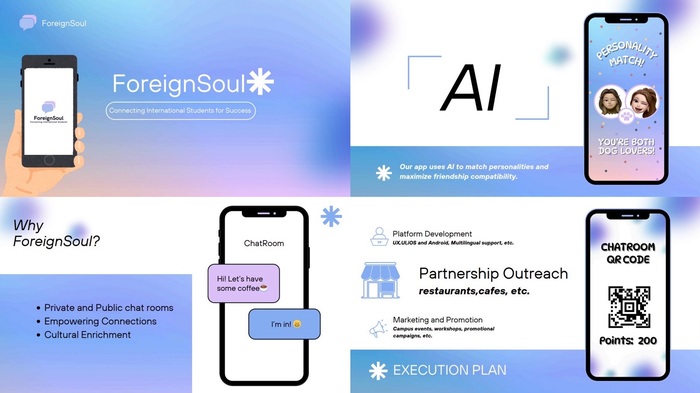Taipei Tech Implements Mandatory AI Course for Freshmen, Encourages Creative and Responsible Adoption of AI

To help students develop critical cross-domain skills irreplaceable by AI, Taipei Tech is encouraging AI adoption among faculty members and students with an emphasis on exploration and critical thinking. Starting in the 2024 academic year, over 1,500 Taipei Tech freshmen are required to complete AI-related credits. Nine Taipei Tech faculty members, working in humanities, design, engineering, and business, have also recently received funding from the Ministry of Education to integrate generative AI in their teaching.
According to Vice President Yang Shih-hsuan, Taipei Tech launched the generative AI-integrated teaching initiative in academic year 2023, encouraging faculty members to explore innovative teaching methods using AI tools. Professors who integrate multiple AI tools in at least three sessions of their classes can apply for subsidies. More than 200 faculty members have also participated in the popular AI workshops since spring 2024.
Yang further indicated that Taipei Tech has restructured its programming course, which is a required course across the board, to incorporate AI and computational thinking. In addition to foundational AI courses, the university offers specialized micro-programs such as Artificial Intelligence and Deep Learning, Digital Engineering Technology and Artificial Intelligence, and Human-centered Natural Language Processing and Interaction Design, providing students flexibility in tailoring their learning paths.
Dean of Academic Affairs Hwang Yuh-shyan noted that over 90% of students find AI tools useful in increasing their interest in self-directed learning and enhancing their engagement with academic content. “Using generative AI in class helps me explore programs and methods I hadn’t considered,” shared one student.
In the Digital Signal Processing course, Professor Chang Chih-yuan collaborated with students to explore practical ways of using generative AI and compiled their findings into a Generative AI Usage Guide. Students also created a Generative AI Bylaw to note down standardized usage, enabling them to customize learning materials. For the final assignment, students used AI to create a course material review packet as a personal, customizable study aid, even adding a song to make studying more engaging.
In Lifestyle Research, Professor Chen Ching-i used tools like Padlet and ChatGPT for user research. She also asked students to utilize ChatGPT to explore what designers can do to nudge users to use a design in real life. This helped students examine generative AI’s role in design and promoted critical thinking.
For the Internet Entrepreneurial Management course, Professor Yin Chin-ching guided students using AI tools for idea generation and product design refinement for their entries in the Makerthon 2024 competition. One project, ForeignSoul, seeks to help match international students with compatible study partners for cultural and academic exchange.
Professor Lin Hwai-en, who teaches Nanostructured Materials Processing, used ChatGPT and ChatPDF to make abstract concepts more accessible. This encouraged active class participation and improved students’ problem-solving skills.
Taipei Tech continues expanding AI education through industry partnerships, preparing students for advanced AI roles and fostering cross-sector collaboration.
According to Vice President Yang Shih-hsuan, Taipei Tech launched the generative AI-integrated teaching initiative in academic year 2023, encouraging faculty members to explore innovative teaching methods using AI tools. Professors who integrate multiple AI tools in at least three sessions of their classes can apply for subsidies. More than 200 faculty members have also participated in the popular AI workshops since spring 2024.
Yang further indicated that Taipei Tech has restructured its programming course, which is a required course across the board, to incorporate AI and computational thinking. In addition to foundational AI courses, the university offers specialized micro-programs such as Artificial Intelligence and Deep Learning, Digital Engineering Technology and Artificial Intelligence, and Human-centered Natural Language Processing and Interaction Design, providing students flexibility in tailoring their learning paths.
Dean of Academic Affairs Hwang Yuh-shyan noted that over 90% of students find AI tools useful in increasing their interest in self-directed learning and enhancing their engagement with academic content. “Using generative AI in class helps me explore programs and methods I hadn’t considered,” shared one student.
In the Digital Signal Processing course, Professor Chang Chih-yuan collaborated with students to explore practical ways of using generative AI and compiled their findings into a Generative AI Usage Guide. Students also created a Generative AI Bylaw to note down standardized usage, enabling them to customize learning materials. For the final assignment, students used AI to create a course material review packet as a personal, customizable study aid, even adding a song to make studying more engaging.
In Lifestyle Research, Professor Chen Ching-i used tools like Padlet and ChatGPT for user research. She also asked students to utilize ChatGPT to explore what designers can do to nudge users to use a design in real life. This helped students examine generative AI’s role in design and promoted critical thinking.
For the Internet Entrepreneurial Management course, Professor Yin Chin-ching guided students using AI tools for idea generation and product design refinement for their entries in the Makerthon 2024 competition. One project, ForeignSoul, seeks to help match international students with compatible study partners for cultural and academic exchange.
Professor Lin Hwai-en, who teaches Nanostructured Materials Processing, used ChatGPT and ChatPDF to make abstract concepts more accessible. This encouraged active class participation and improved students’ problem-solving skills.
Taipei Tech continues expanding AI education through industry partnerships, preparing students for advanced AI roles and fostering cross-sector collaboration.